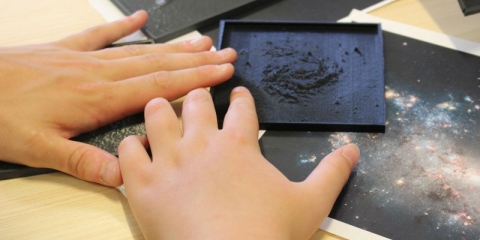

The Tactile Universe makes astronomy research accessible to the blind and vision impaired community.
A University of Portsmouth project to help blind and vision impaired people ‘see’ the Universe has been chosen as one of the breakthrough of the year projects in an international competition.
The Tactile Universe was developed by the University’s Institute of Cosmology and Gravitation to make astronomy research accessible to the blind and vision impaired community. The team print 3D images of galaxies, which allow people to ‘see’ the Universe by feeling the shapes of these astronomical objects.
It’s the brainchild of Dr Nicolas Bonne, a vision impaired astronomer, who wanted to show people – especially children – that anyone can be an astronomer.

This project is really important because we all believe that astronomy should be for everybody. Through this project we want to be able to show young people, who are blind or vision impaired, that they can access and even study STEM subjects like astronomy if that’s where their passions lie.
Dr Bonne said: “From the age of five, when the Voyager space probe started sending back beautiful pictures of the planets of the outer Solar System, I was hooked on space and knew I wanted to be an astronomer.
“But astronomy is seen as such a visual subject both in the way it’s researched and the way it’s communicated to the public, which means a lot of blind and vision impaired people can find it really difficult to access.
“I wanted to make something that could help to inspire and teach people about astronomy, regardless of whether they can see or not.”
The Tactile Universe was chosen as one of the science breakthroughs of the year in the category of science engagement by the Falling Walls Foundation, which aims to highlight breakthrough thinking from around the world.
The German competition saw 940 research projects nominated from over 100 countries across the 10 categories. The winners were announced during the Falling Walls conference and Berlin Science Week, which were held virtually last week.
Dr Bonne said: “I’m passionate about making astronomy accessible and I’m thrilled the project has been internationally recognised. Unfortunately we weren’t able to attend the conference in person this time, but we’ve been invited as guests of honour for next year’s event.”
